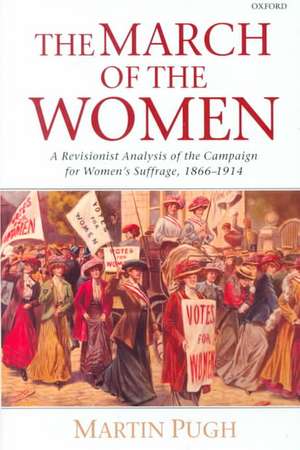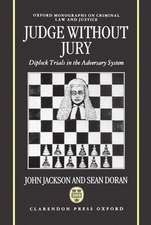The March of the Women: A Revisionist Analysis of the Campaign for Women's Suffrage, 1866-1914
Autor Martin Pughen Limba Engleză Hardback – 13 apr 2000
| Toate formatele și edițiile | Preț | Express |
|---|---|---|
| Paperback (1) | 375.91 lei 31-37 zile | |
| OUP OXFORD – 3 ian 2002 | 375.91 lei 31-37 zile | |
| Hardback (1) | 1008.95 lei 31-37 zile | |
| OUP OXFORD – 13 apr 2000 | 1008.95 lei 31-37 zile |
Preț: 1008.95 lei
Preț vechi: 1532.93 lei
-34% Nou
Puncte Express: 1513
Preț estimativ în valută:
193.12€ • 209.85$ • 162.33£
193.12€ • 209.85$ • 162.33£
Carte tipărită la comandă
Livrare economică 10-16 aprilie
Preluare comenzi: 021 569.72.76
Specificații
ISBN-13: 9780198207757
ISBN-10: 0198207751
Pagini: 316
Dimensiuni: 162 x 242 x 22 mm
Greutate: 0.6 kg
Editura: OUP OXFORD
Colecția OUP Oxford
Locul publicării:Oxford, United Kingdom
ISBN-10: 0198207751
Pagini: 316
Dimensiuni: 162 x 242 x 22 mm
Greutate: 0.6 kg
Editura: OUP OXFORD
Colecția OUP Oxford
Locul publicării:Oxford, United Kingdom
Recenzii
The questions posed and conclusions reached in this important work should enjoin historians to impose a more critical standard to both existing and future scholarship ... Pugh's remarkable essay will produce an extensive and necessary revision of the basic interpretations and overall understanding of the women's suffrage movement.
Martin Pugh has not only produced a 'revisionist analysis of the campaign for women's suffrage' but also the most important and provocative examination of the suffrage movement in 30 years. The March of the Women establishes new benchmarks and sets out new barriers that all future scholarship concerning women's suffrage must be able to address and satisfy.
This welcome synoptic account of the campaign for women's suffrage between the 1860s and the first world war skillfully blends a sustained engagement with recent scholarship and extensive primary research ... an impressive work which does much to clarify our understanding of the position of the suffrage issue with late Victorian and Edwardian politics.
The particular value of this book is that Martin Pugh grounds his study in a much wider conception of politics than many comparable works. His analysis of parliamentary tactics and the role of women in local government is exemplary. Just as useful is his work on the suffragists' involvement in by-election campaigns. But this lengthy sub-section will not be the main focus of most readers' attention. For many, it will be Pugh's boldly revisionist chronology that makes this book worthwhile.
This is a major contribution to the subject, and one that will influence the terms of debate for many years to come. It is an unabashedly revisionist study, which uses new insights, new research and new analysis to overturn the traditional account of the suffrage movement.
Pugh brings to the story four essential qualities: a round understanding of the British political structure and how it has evolved; a rich grounding in the archives and secondary sources; a full awareness that here the distinction between social and political history is important; and above all, the historian's fair-minded determination to see things as contempories saw them, without hindsight, wishful thinking or preaching.
Martin Pugh has not only produced a 'revisionist analysis of the campaign for women's suffrage' but also the most important and provocative examination of the suffrage movement in 30 years. The March of the Women establishes new benchmarks and sets out new barriers that all future scholarship concerning women's suffrage must be able to address and satisfy.
This welcome synoptic account of the campaign for women's suffrage between the 1860s and the first world war skillfully blends a sustained engagement with recent scholarship and extensive primary research ... an impressive work which does much to clarify our understanding of the position of the suffrage issue with late Victorian and Edwardian politics.
The particular value of this book is that Martin Pugh grounds his study in a much wider conception of politics than many comparable works. His analysis of parliamentary tactics and the role of women in local government is exemplary. Just as useful is his work on the suffragists' involvement in by-election campaigns. But this lengthy sub-section will not be the main focus of most readers' attention. For many, it will be Pugh's boldly revisionist chronology that makes this book worthwhile.
This is a major contribution to the subject, and one that will influence the terms of debate for many years to come. It is an unabashedly revisionist study, which uses new insights, new research and new analysis to overturn the traditional account of the suffrage movement.
Pugh brings to the story four essential qualities: a round understanding of the British political structure and how it has evolved; a rich grounding in the archives and secondary sources; a full awareness that here the distinction between social and political history is important; and above all, the historian's fair-minded determination to see things as contempories saw them, without hindsight, wishful thinking or preaching.













